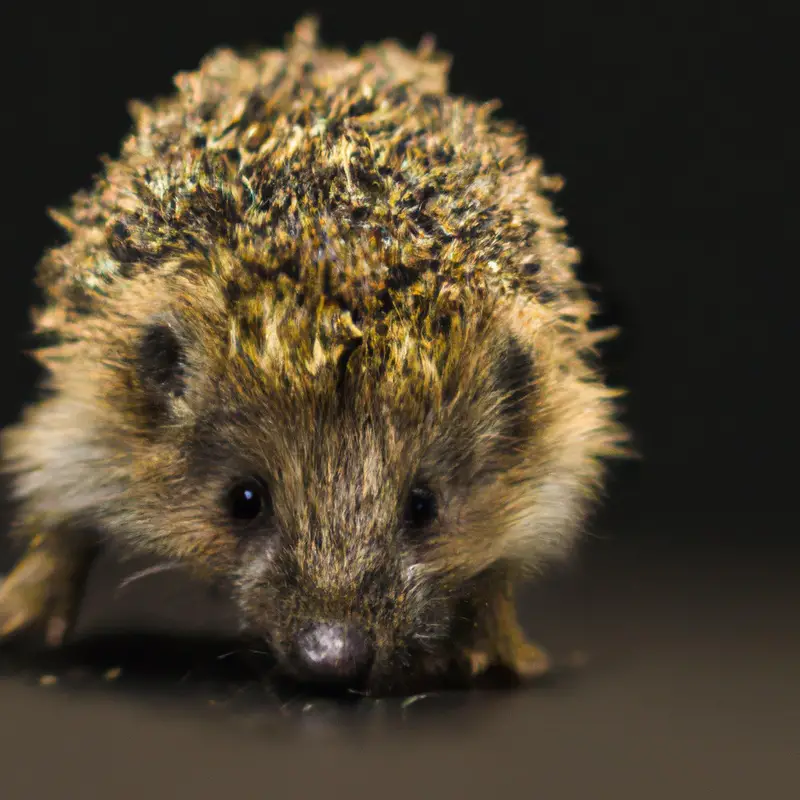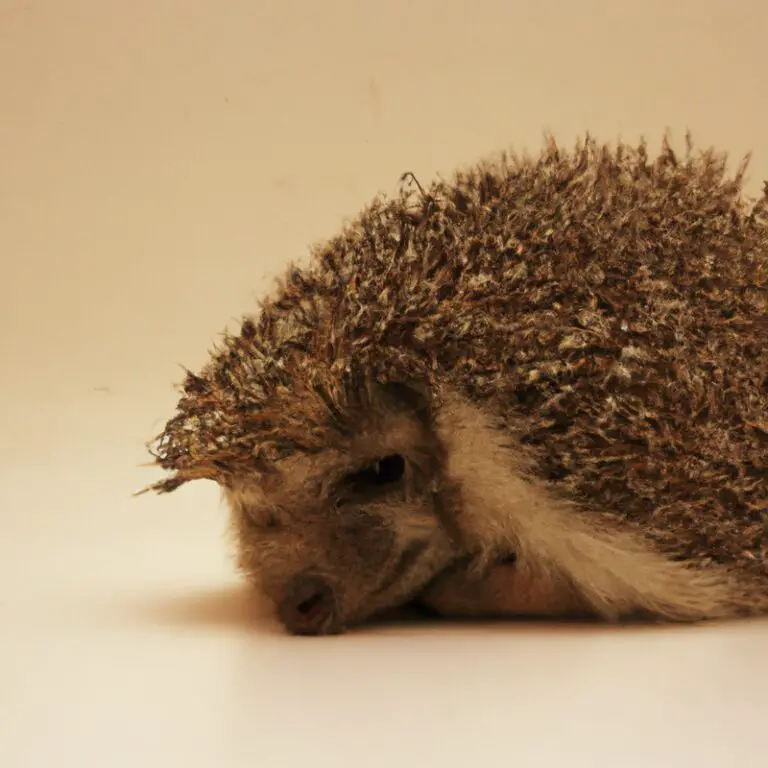How Do Hedgehogs Find Water?
Key Takeaways:
- Hedgehogs primarily find water by searching for natural sources such as ponds or streams.
- They have a keen sense of smell that helps them locate sources of water.
- Hedgehogs can also obtain water from the food they eat, reducing their need for external water sources.
- Providing a shallow dish of fresh water in your garden can help hedgehogs stay hydrated.
Have you ever wondered how hedgehogs find water in the wild or how to provide water for them as pets?
Hedgehogs are fascinating creatures that have adapted unique ways to quench their thirst.
In this article, we’ll explore their water needs, discuss the reasons behind their requirement for water, and take a closer look at their methods for finding it in the wild.
We’ll also delve into ways to provide water for pet hedgehogs and answer some common queries about their water intake.
So, let’s dive in and uncover the secrets of how hedgehogs find water!
| Method | Description |
| Sense of Smell | Hedgehogs have a keen sense of smell and can detect water sources by following their scent. |
| Observation | They may find water by observing other animals visiting water sources, such as birds drinking from puddles. |
| Rainwater Collection | Hedgehogs can collect rainwater from plants or objects they encounter while foraging. |
| Dew | In humid environments, hedgehogs can obtain moisture from dew that forms on grass and plants. |
| Food Moisture | Hedgehogs can also obtain water from the moisture content of the food they consume, especially juicy insects and fruits. |
Hedgehog’s Water Needs
Hedgehogs require water to stay hydrated and maintain their overall health.
Why do hedgehogs need water?
Hedgehogs need water for a few important reasons. First, water helps keep their bodies hydrated, just like it does for us humans.
Hydration is essential for their overall health and well-being.
Second, water helps hedgehogs with digestion. It helps move food through their system and prevents constipation.
Lastly, water is necessary for hedgehogs to keep their quills clean.
They may use water to wash away dirt or mites that can irritate their skin. So, providing a source of fresh water for hedgehogs is vital for their health and happiness.
How much water do hedgehogs need?
Hedgehogs need a sufficient amount of water to stay hydrated, but they don’t require as much as other animals. On average, hedgehogs need around 50-100ml of water per day.
It’s best to provide them with fresh water in a shallow bowl or dish, as they may have difficulty drinking from bottle-style containers.
Avoid offering milk or sugary drinks, as hedgehogs cannot digest them properly. Monitoring their water intake and ensuring it’s readily available will help keep your hedgehog healthy and hydrated.

Sources of water for hedgehogs
Hedgehogs can find water in various sources.
Here are some common sources of water for hedgehogs:
- Natural water sources: Hedgehogs are known to drink from natural water sources such as ponds, streams, and rivers.
- Garden features: They may also drink from garden features like bird baths, water troughs, or shallow pools.
- Rainwater: Hedgehogs are capable of collecting rainwater from leaves and puddles, which can provide them with hydration.
- Accessible water bowls: Providing a shallow and accessible water bowl in your garden can also attract hedgehogs and help them stay hydrated.
- Wet food: Hedgehogs can also obtain moisture from certain foods, like wet cat or dog food.
Remember to frequently clean and refill any water sources you provide for hedgehogs to keep it fresh and safe for them to drink.
By considering these available sources of water, you can create a welcoming and hydrated environment for hedgehogs in your garden.
How do hedgehogs find water in the wild?
Hedgehogs find water in the wild by searching for natural sources such as rivers, streams, and puddles. They use their keen sense of smell to detect the presence of water in their surroundings.
Hedgehogs are also resourceful and can obtain water from the food they eat, such as insects and plants, which contain moisture.
Additionally, they are known to lick dew off vegetation early in the morning to quench their thirst.
Hedgehog Adaptations for Finding Water
Hedgehogs have developed a keen sense of smell to locate water sources.
They also rely on their whiskers and observe water sources from a distance.
Developing a keen sense of smell
Developing a keen sense of smell is an important adaptation for hedgehogs to survive in their environment. By relying on their sense of smell, hedgehogs can locate food sources, identify potential predators, and even find water.
Their ability to sniff out water is particularly important, as it helps them stay hydrated in dry conditions.
This acute sense of smell allows hedgehogs to navigate their surroundings and find the resources they need to thrive.

Utilizing their whiskers
Hedgehogs utilize their whiskers to navigate and find water.
These specialized hairs are highly sensitive and can detect changes in air and water currents.
When a hedgehog is near water, its whiskers will pick up on the moisture, allowing it to locate a reliable water source.
This adaptation is essential for their survival in arid environments.
So, next time you see a hedgehog with its adorable whiskers, remember they’re not just for looks – they’re helping them quench their thirst!
Observing water sources from a distance
Observing water sources from a distance is a crucial skill for hedgehogs. They have sharp senses that help them detect water sources efficiently.
Their keen sense of smell allows them to sniff out areas where water may be present, such as puddles or damp soil.
Additionally, hedgehogs have good hearing and can listen for the sound of running water. By using their senses to observe potential water sources from afar, hedgehogs can navigate towards hydration without wasting unnecessary energy.
Ways to Provide Water for Pet Hedgehogs
There are a few different ways to provide water for your pet hedgehog.
Water bowls or dishes
Water bowls or dishes are a simple and effective way to provide hydration to your pet hedgehog. Choose a shallow dish that is heavy and sturdy to prevent tipping.
Ceramic or stainless steel bowls are the best options, as they are easy to clean and won’t harbor bacteria.
Place the water bowl in a safe and easily accessible location for your hedgehog. Remember to clean and refill the bowl with fresh water daily to ensure your hedgehog has a constant supply of water.
Automatic water dispensers
Automatic water dispensers are a convenient option for providing water to your pet hedgehog. These dispensers are designed to release a steady supply of water on demand, ensuring that your hedgehog always has access to fresh water.
They work by utilizing a gravity-fed system or a ball bearing mechanism that releases water when your hedgehog pushes against it.
Automatic water dispensers help prevent spillage and keep the water clean, making it a hassle-free option for keeping your hedgehog hydrated. Remember to clean and refill the dispenser regularly to ensure your hedgehog’s water remains fresh.
Misting or dropper method
Misting or the dropper method are two effective ways to provide water for pet hedgehogs. With the misting method, you can use a clean spray bottle to mist water onto the sides of their enclosure or onto a shallow dish.
This allows them to lick the water droplets as they condense.
The dropper method involves using a clean dropper to drop water onto their snout or directly into their mouth. Both methods help ensure your hedgehog stays hydrated and healthy.
Monitoring water intake for pet hedgehogs
When monitoring water intake for your pet hedgehog, make sure to provide a water dish that is shallow and stable. Position it in an easily accessible area of the cage.
Check the dish daily to ensure it is clean and filled with fresh water.
To monitor their water intake, observe how much water they drink and note any changes in their behavior or appearance. If you notice a decrease in water consumption or signs of dehydration, contact a veterinarian for further guidance.
Common Queries about Hedgehog’s Water Needs
Common Queries about Hedgehog’s Water Needs: Addressing concerns regarding hedgehogs and drinking tap water, milk, lack of water consumption, and their ability to swim.
Can hedgehogs drink tap water?
Hedgehogs can drink tap water, but it’s not the best option for them.
Tap water often contains chemicals like chlorine that can be harmful to hedgehogs.
It’s recommended to provide them with filtered or bottled water instead.
Make sure the water is at room temperature and change it daily to ensure freshness.
Do hedgehogs drink milk?
Hedgehogs do not typically drink milk. While they are mammals, they do not have the ability to digest lactose, which is the sugar found in milk.
Feeding hedgehogs milk can lead to digestive issues and upset stomachs.
It is important to provide them with fresh water instead to meet their hydration needs.
What to do if a hedgehog is not drinking water?
If you notice that your hedgehog is not drinking water, it’s important to take action to ensure their hydration. Here’s what you can do:
- Offer fresh water: Make sure there is always a clean and fresh supply of water available for your hedgehog. Use a shallow dish or a water bottle designed specifically for small animals.
- Check the temperature: Hedgehogs may not drink water if it’s too cold or too hot. Ensure the water is at a comfortable temperature, around room temperature.
- Provide wet food: Introduce wet foods such as fruits, vegetables, or wet cat food into your hedgehog’s diet. These foods have higher moisture content and can contribute to their hydration.
- Consult a veterinarian: If your hedgehog continues to refuse water or shows signs of dehydration, it’s best to consult a veterinarian for further guidance and evaluation.
Remember, maintaining proper hydration is crucial for the well-being of your hedgehog.
Can hedgehogs swim?
Yes, hedgehogs can swim! Despite their prickly appearance, hedgehogs are actually quite adept in the water.
They have the ability to paddle and move through water using their limbs.
In fact, swimming can be a natural instinct for hedgehogs when faced with water obstacles in their habitat.
However, it’s important to note that while hedgehogs can swim, they are not strong swimmers and may struggle in deep water.
So, it’s best to ensure they have an accessible exit if you have a pool or pond in your garden.
Final Verdict
Hedgehogs have unique adaptations that enable them to find water in their natural habitats.
Their keen sense of smell, whiskers, and ability to observe water sources from a distance allow them to locate water even in arid environments.
For pet hedgehogs, it is essential to provide water through bowls, automatic dispensers, or misting methods and monitor their water intake.
Hedgehogs should never be given tap water or milk, as it can be harmful to their health.
If a hedgehog is not drinking water, it is important to consult a veterinarian.
While hedgehogs can swim, it is best to avoid exposing them to water unless necessary.
Overall, understanding and meeting a hedgehog’s water needs is crucial for their well-being.








